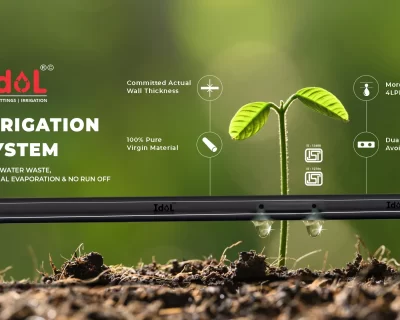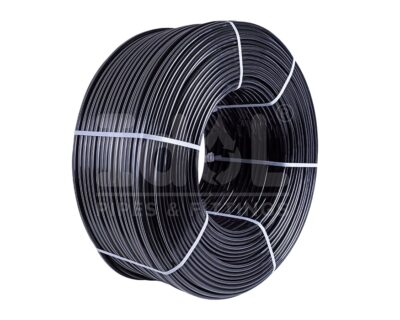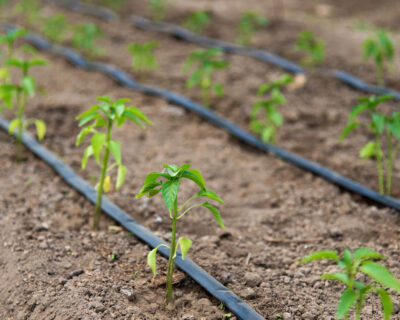Updates

Sustainable Farming Solutions: Drip Irrigation Takes Root in Algeria
Introduction
Brief overview of the importance of sustainable farming solutions:
Sustainable agricultural solutions are critical to ensuring long-term food security, environmental protection and economic stability. With a rapidly growing global population and limited natural resources, it is imperative to adopt agricultural practices that minimize negative impact on the environment while maximizing productivity. Sustainable farming promotes ecological balance, conserves resources, and increases the overall resilience of agricultural systems.
Introduce the concept of drip irrigation and its significance in agriculture:
Drip irrigation is a highly efficient and precise method of delivering water directly to the root zone of plants. Unlike traditional irrigation methods that flood entire fields, drip irrigation delivers water in a slow, controlled manner through a network of tubes or pipes with emitters located near the roots of plants. This targeted approach significantly reduces water wastage and ensures that plants receive water in the most efficient manner.
The importance of drip irrigation installation lies in its ability to address the challenges of water scarcity, optimize water use, and improve crop yields. By supplying water directly to the root zone, drip irrigation reduces evaporation and runoff, making it an ideal choice for areas facing water scarcity or limited water resources. In addition, drip irrigation enables farmers to apply water and nutrients precisely, promoting healthy plant growth, reducing weed competition, and reducing the risk of diseases. The increased water and resource efficiency associated with drip irrigation also leads to higher crop yields, improved produce quality, and potentially lower labor and maintenance costs for farmers.Overall, drip irrigation kits plays an important role in sustainable agriculture by conserving water, protecting the environment and ensuring the long-term viability of agricultural systems.
Agriculture in Algeria
Overview of Algeria’s agricultural sector
Algeria’s agricultural sector plays an important role in the country’s economy and food security. Agriculture in Algeria is diverse, with a wide variety of crops including cereals, vegetables, fruits, and livestock production. This sector employs a large section of the population, especially in rural areas. Agriculture contributes to both domestic consumption and export revenue, making it an important sector for economic development.
Challenges faced by Algerian farmers, including water scarcity and inefficient irrigation methods:
Algerian farmers face many challenges that hinder agricultural productivity and sustainability. One of the primary constraints is water scarcity. Algeria has a semi-arid to arid climate, with limited fresh water resources and irregular rainfall patterns. Inadequate water availability poses a significant constraint on agricultural activities, affecting crop yields and livestock production.
Furthermore, inefficient irrigation methods have exacerbated the issue of water scarcity. Traditional irrigation techniques, such as flood irrigation, are commonly used in Algeria, but significant water losses occur due to evaporation, runoff, and inefficient distribution. These methods often fail to provide optimum moisture levels to plants and can lead to waterlogging, soil erosion and nutrient leaching.
Inefficient water management practices also contribute to the depletion of underground water resources, adding to the problem of water scarcity. Over-exploitation of groundwater for irrigation purposes can lead to depletion of aquifers and salt water intrusion, further threatening the long-term sustainability of agricultural activities.
Drip Irrigation: A Sustainable Solution
A. Explanation of drip irrigation system and its benefits:
Drip irrigation is an advanced irrigation technique that delivers water directly to plant roots in a slow and controlled manner. This system consists of a network of tubes or pipes with emitters at regular intervals near the plants. Water is released in small, precise amounts, allowing it to drip slowly onto the soil surface or directly into the root zone. This targeted approach ensures that water reaches plant roots where it is needed most, minimizing losses through evaporation or runoff.
The benefits of drip irrigation are manifold. First, it greatly improves the efficiency of water use. By delivering water directly to the root zone, automated drip irrigation system reduces water waste through evaporation and runoff. This efficiency can result in water savings of up to 50% compared to conventional irrigation methods.
Secondly, drip irrigation promotes healthy plant growth and higher crop yields. The controlled and even water distribution provided by drip systems ensures that plants receive a constant supply of water, avoiding over or under watering. This optimized water supply enhances plant health, encourages deep root development, and promotes more efficient nutrient uptake.
Discussion on how drip irrigation addresses water scarcity and minimizes water wastage:
Drip irrigation plays an important role in addressing the challenges of water scarcity. By providing water directly to the root zone, drip systems reduce water loss through evaporation and surface runoff. This precise water application ensures that plants receive the moisture they need without wasting water in areas where it is not needed, thereby optimizing water use.
Drip irrigation also reduces dependence on freshwater sources. This enables farmers to use alternative water sources such as treated wastewater, brackish water, or collected rainwater, which may not be suitable for other irrigation methods. This versatility contributes to sustainable water management and ensures the efficient use of available water resources.
C. Environmental advantages of drip irrigation, such as reduced soil erosion and fertilizer runoff:
Drip irrigation provides many environmental benefits. First, by delivering water directly to the root zone, drip systems reduce soil erosion. Traditional irrigation methods, such as surface flooding, can cause soil erosion due to excessive runoff of water. Drip irrigation reduces the velocity and amount of water applied to the soil surface, thereby conserving topsoil and preventing erosion.
In addition, drip irrigation helps reduce fertilizer runoff and leaching. With traditional irrigation methods, fertilizers applied to the soil can be washed away by excessive water, polluting water bodies and causing environmental damage. Drip systems enable precise and localized fertilizer application, ensuring nutrients are delivered directly to the root zone, reducing runoff and protecting water quality.
Implementation of Drip Irrigation in Algeria
A. Overview of initiatives promoting drip irrigation in Algeria:
Several initiatives have been implemented in Algeria to promote the adoption of drip irrigation. These initiatives aim to address challenges faced by Algerian farmers, such as water scarcity and inefficient irrigation methods. Various organizations including government bodies, non-governmental organizations (NGOs) and international agencies are involved in promoting and supporting drip irrigation in the country.
These initiatives promote research and development activities to increase awareness of the benefits of drip irrigation, provide training and technical support to farmers, facilitate access to drip irrigation systems and equipment, and optimize drip irrigation techniques for Algerian conditions. focused on giving. These efforts are aimed at encouraging farmers to adopt drip irrigation as a sustainable and efficient irrigation method.
B. Government support and policies encouraging the adoption of drip irrigation:
The Algerian government has recognized the importance of drip irrigation and implemented policies to encourage its adoption. These policies include financial incentives, subsidies and support programs specifically targeting the agriculture sector. The government provides financial assistance to farmers to help them invest in drip irrigation infrastructure, equipment and training.
Additionally, the government has introduced regulations and standards to ensure the quality and performance of drip irrigation systems available in the market. This helps farmers make informed choices and ensures that they have access to reliable and efficient drip irrigation technology.
C. Success stories and case studies highlighting the positive impact of drip irrigation on Algerian farms:
Numerous success stories and case studies demonstrate the positive impact of drip irrigation on Algerian farms. These stories highlight increased crop yields, improved water use efficiency and increased profitability for farmers.
For example, drip irrigation has been successfully implemented in vegetable farms in areas facing water scarcity. Farmers have reported significant improvements in crop quality and yield, reduced water consumption, and better control over irrigation scheduling. The use of drip irrigation has also allowed farmers to extend their growing season and cultivate higher value crops.
The case study also demonstrates the economic benefits of drip irrigation. By reducing water and labor costs, farmers have been able to improve their financial returns and increase the sustainability of their farms. Drip irrigation has played an important role in increasing the livelihood of Algerian farmers and making agriculture a more profitable enterprise.
Advantages for Algerian Farmers
A. Increased crop yield and improved crop quality:
One of the important benefits of drip irrigation for Algerian farmers is the potential for increased crop yields and improved crop quality. Drip irrigation delivers water directly to the root zone of plants, ensuring they receive an adequate and consistent supply of water. This optimized water application promotes healthy plant growth,Increases nutrient uptake, and reduces water stress, ultimately leading to higher yields. Algerian farmers who have adopted drip irrigation have reported significant increases in crop productivity, allowing them to meet market demands and improving food security.In addition, the controlled water supply provided by drip irrigation often results in improved crop quality, including better color, shape, and taste of produce, which can further enhance market competitiveness.
B. Reduction in labor and maintenance costs:
Drip irrigation offers significant benefits for Algerian farmers in terms of labor and maintenance costs. Compared to traditional irrigation methods, such as flood irrigation, drip irrigation requires less labor to operate and maintain. Once the system is properly set up and installed, the automated nature of drip irrigation reduces the need for constant monitoring and manual labor associated with traditional irrigation techniques.Farmers can allocate their labor resources more efficiently while focusing on other important agricultural activities such as crop management, harvesting and marketing. Additionally, drip irrigation systems generally require less maintenance and repair than conventional irrigation systems, reducing overall maintenance costs for farmers.
C. Economic benefits and potential for export growth:
Drip irrigation holds significant economic benefits for Algerian farmers. By improving crop yield and quality, farmers can earn higher revenue from their agricultural production. The increased productivity resulting from drip irrigation can contribute to the economic growth of individual farmers as well as the agriculture sector as a whole.In addition, drip irrigation allows for better water and resource management, reducing water consumption and input costs such as fertilizer. This cost reduction directly translates into better profitability for the farmers.
Conclusion
A. Recap of the importance of sustainable farming solutions:
Finally, sustainable agricultural solutions are critical to ensuring long-term food security, environmental protection and economic stability. By adopting practices that minimize negative impacts on the environment and maximize productivity, farmers can contribute to a more sustainable future for agriculture. Sustainable agriculture solutions help address challenges such as water scarcity, soil degradation and inefficient resource use, thereby ensuring the resilience and viability of agricultural systems.
B. Emphasize the transformative potential of drip irrigation in Algeria’s agricultural sector:
Drip irrigation has enormous transformative potential for the Algerian agricultural sector. It offers a sustainable and efficient solution to address the challenges faced by Algerian farmers, especially water scarcity and inefficient irrigation methods. By adopting drip irrigation, farmers can optimize water usage,Can increase crop yield, improve crop quality, and reduce labor and maintenance costs. Drip irrigation provides a route to sustainable agricultural development, contributing to food security, economic development and environmental management.
C. Call to action for continued support and investment in sustainable farming practices like drip irrigation:
Continued support and investment is necessary to realize the full potential of sustainable agricultural practices such as drip irrigation in Algeria. Governments, agricultural institutions and stakeholders should give priority to the promotion and adoption of drip irrigation systems. This can be achieved through financial incentives, capacity building programmes, research and development initiatives and establishment of effective policies and regulations.
Encouraging collaboration between public and private sectors as well as knowledge sharing among farmers will further accelerate the adoption and dissemination of drip irrigation technologies. By investing in sustainable agricultural practices such as drip irrigation, Algeria can increase agricultural productivity, reduce environmental challenges and secure a prosperous future for its agricultural sector.

